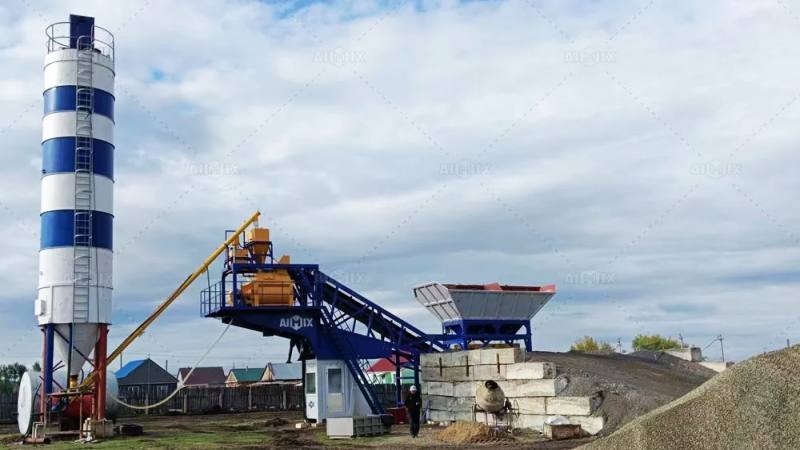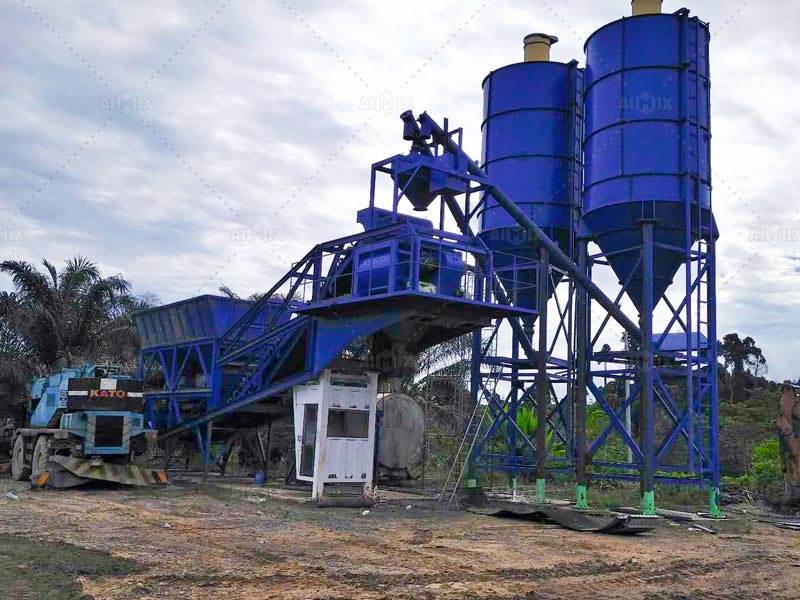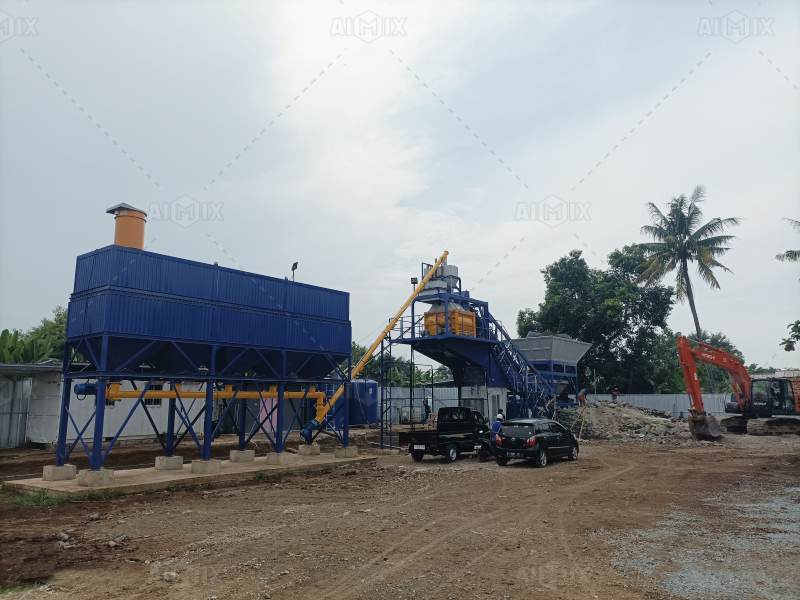In 2025, the demand for mobile concrete plants is on the rise due to their flexibility, ease of transport, and ability to mix concrete directly on-site. These plants are especially popular in construction projects where space is limited, and there’s a need for a high volume of concrete in a short time frame. However, choosing the right mobile concrete plant for your business involves understanding the different types of plants available, their prices, and how they compare to other concrete mixing solutions, such as stationary concrete batch plants for sale. You will know more information about mobile concrete plant price.
What is a Mobile Concrete Plant?
A mobile concrete plant is a portable facility that can produce concrete at construction sites, offering a convenient solution for projects that require frequent relocations or are based in remote areas. The key advantage of a mobile concrete plant is that it can be easily transported and set up at different locations, reducing transportation costs and improving efficiency. This type of batching plant is compact and usually consists of a mixing unit, a cement silo, and aggregate storage, all mounted on a single chassis.

Different Types of Batching Plants
Before diving into pricing, it’s essential to understand the different types of batching plants available. The most common types are:
-
Mobile Concrete Plants
As mentioned, mobile plants are portable and designed for on-site production of concrete. They are ideal for small to medium-sized construction projects, such as residential buildings, roads, and bridges, where frequent site relocation is necessary. They are generally compact, easy to assemble, and can be set up quickly. -
Stationary Concrete Plants
Stationary concrete batch plants are fixed in one location and are typically used for large-scale projects where high-volume concrete production is needed. These plants are more complex and durable than their mobile counterparts, offering a larger production capacity. They are ideal for projects like large infrastructure developments, highways, or ready-mixed concrete supply. -
Compact Concrete Plants
Compact plants are smaller than traditional stationary plants but offer a higher capacity than mobile plants. These are used for projects that require a good balance between portability and production output, offering an efficient solution without compromising on quality or consistency. -
Wet Mix Concrete Plants
Wet mix plants produce ready-mixed concrete, where all ingredients are mixed thoroughly before being loaded into the mixer truck. They are beneficial for large-scale construction projects where consistent concrete quality is critical. -
Dry Mix Concrete Plants
In dry mix plants, the materials are mixed in the truck mixer after being transported. This type is typically used for smaller construction jobs or for projects where the ingredients need to be stored and mixed on-site.
Each type of batching plant has its benefits and is suited to different project requirements. Mobile concrete plants are generally favored for their portability, while stationary plants are chosen for their capacity and efficiency on long-term, high-output projects.

Factors Influencing Mobile Concrete Plant Prices
The cost of a mobile concrete plant can vary widely depending on several factors:
-
Production Capacity
Mobile concrete plants typically come in various capacities, ranging from 20 cubic meters per hour to 60 cubic meters per hour or more. The higher the production capacity, the more expensive the plant will be. Businesses must consider how much concrete they need to produce daily and match that with an appropriate plant capacity. -
Brand and Quality
The brand you choose can significantly affect the price. Well-known brands such as Aimix, Aicrane, and Schwing Stetter often command higher prices due to their reputation for quality and reliability. Investing in a reputable brand can ensure better performance, durability, and after-sales support. -
Design and Features
The design and additional features of the mobile concrete plant also play a role in the overall cost. Features such as automatic batching systems, advanced control panels, and enhanced mobility (e.g., easier disassembly for transport) can increase the price. Optional components like additional silos, advanced mixers, or improved dust collection systems can also add to the cost. -
Site Preparation and Installation
Though mobile concrete plants are designed for quick setup, there may still be additional costs for site preparation, including leveling the ground, providing a stable power supply, or setting up water sources. Installation costs can also vary depending on the complexity of the plant and the specific site requirements. -
Market Conditions
Supply and demand also impact concrete batching plant prices. In regions where construction is booming, such as in developing countries or areas undergoing urbanization, the prices for batching plants—mobile and stationary alike—may increase due to the higher demand for machinery.
Mobile Concrete Plant Pricing in 2025
In 2025, mobile concrete plant prices generally range from $50,000 to $250,000, depending on capacity, brand, and features. Here’s a rough breakdown of pricing:
-
Small Capacity (20-30 cubic meters/hour): Prices can range from $50,000 to $80,000. These are suitable for smaller-scale projects, such as residential buildings and small commercial developments.
-
Medium Capacity (30-50 cubic meters/hour): Expect to pay between $80,000 and $150,000 for a plant of this size. These plants can handle mid-sized projects, including road construction and commercial developments.
-
Large Capacity (50-60+ cubic meters/hour): The price for high-capacity mobile concrete plants can exceed $150,000, reaching up to $250,000 or more. These plants are ideal for large-scale infrastructure projects like highways, dams, or city-wide construction operations.

Comparing Mobile Concrete Plants to Stationary Concrete Batch Plants for Sale
While mobile plants offer mobility and ease of relocation, stationary concrete batch plants are better suited for businesses that require consistent high-output production in a fixed location. Stationary plants usually cost more upfront due to their larger size, complex features, and higher production capabilities. Prices for stationary plants generally range from $100,000 to $500,000 or more, depending on the size and production capacity.
For businesses with long-term operations or projects requiring a consistent concrete supply, a stationary plant might be a better investment. However, if your business needs flexibility and the ability to move between job sites, a mobile concrete plant offers excellent value and convenience.
Conclusion
When choosing between mobile and stationary concrete plants, businesses must consider project needs, budget, and long-term goals. Mobile concrete plants offer the flexibility and portability needed for smaller to medium-scale construction projects, while stationary plants provide higher production capabilities for larger, long-term operations. Prices for mobile concrete plants in 2025 vary depending on capacity, brand, features, and market conditions, so it’s important to carefully evaluate all options before making a purchase. Whether you’re purchasing a stationary concrete batch plant for sale or a mobile concrete plant, make sure to balance cost with functionality to ensure the best return on investment for your business.